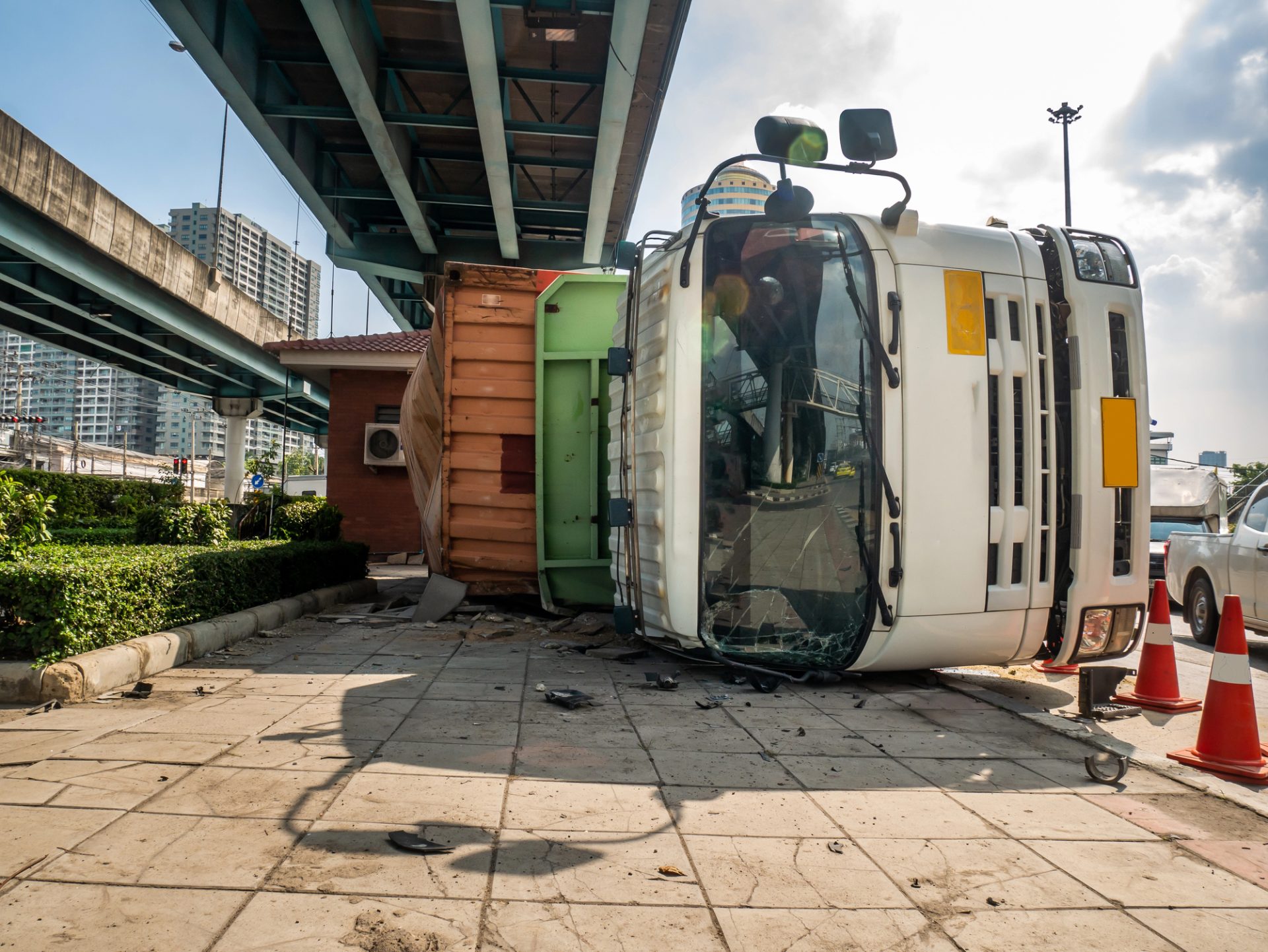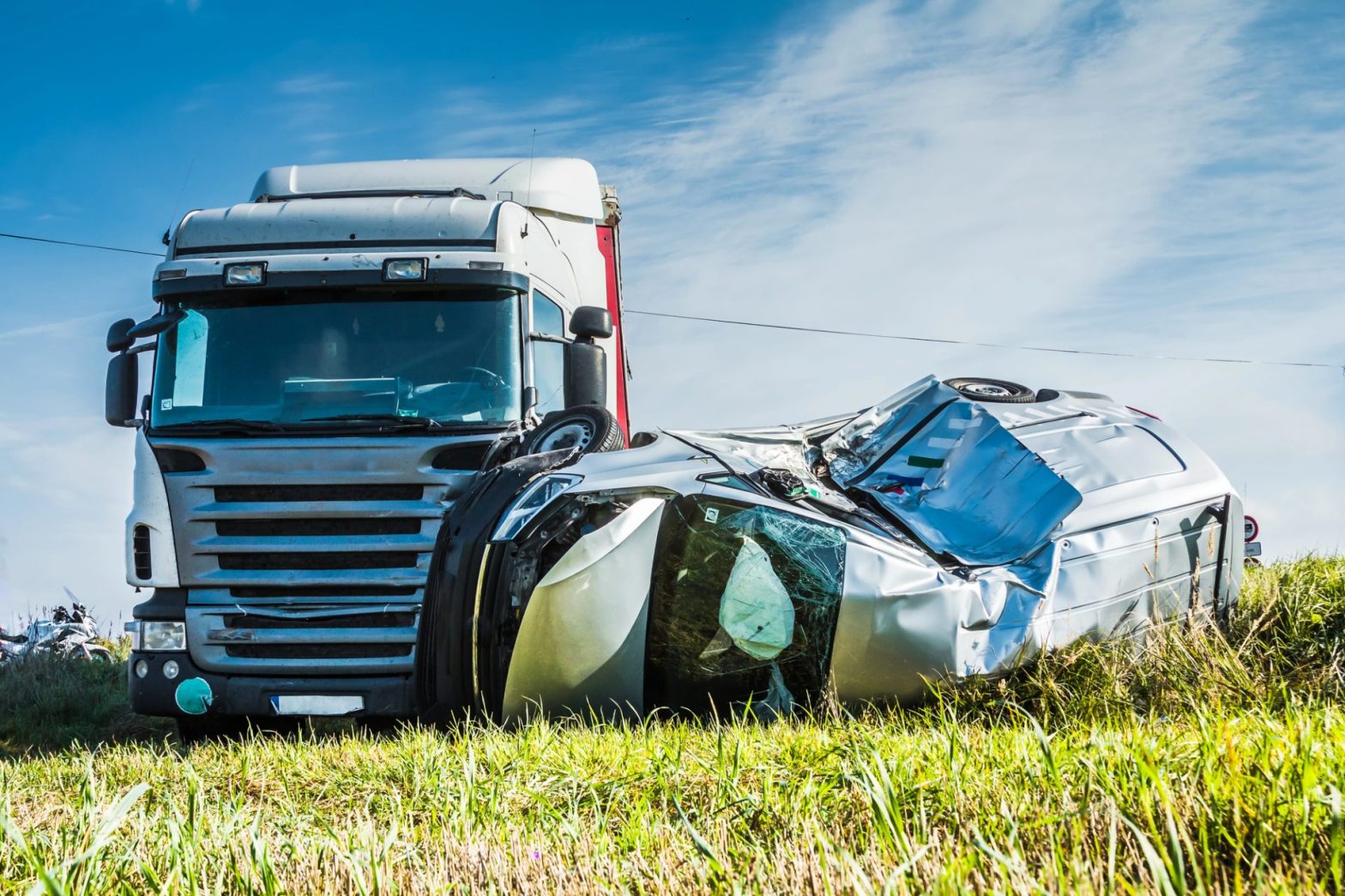The impact of large truck rollover accidents can be life-changing, with those involved facing the risk of severe injuries, property damage, and even loss of life. Matters can become more complicated if injured parties wish to seek compensation for their damages, especially if multiple parties are liable for the accident. So, why do large truck rollover crashes occur and how does pinning liability work?
What Does Rollover Mean in Accidents?
A rollover accident involves a vehicle tipping over to one side or flipping onto its roof. Even though most types of vehicles can roll over, large trucks are more susceptible owing to their inherent design. Rollover accidents can come in two forms.
- Tripped. A tripped rollover takes place when a vehicle comes in contact with an external object, which could be a curb, median, guard rail, or another vehicle. The impact results in the driver losing control of the vehicle, causing the off-balance and unstable vehicle to roll over. Old NASS CDS data indicates that tripped rollovers account for around 95% of all single-vehicle rollover accidents.
- Untripped. An untripped rollover occurs because of a vehicle’s dynamics and how it reacts to gravity in different scenarios, with no external factors at play. For example, the centrifugal force that a large truck generates when taking a sharp turn can cause it to roll over.
What Makes Large Trucks More Susceptible?
If you look at what vehicles have the highest rollover risk, you will find large trucks and buses in the bracket. This is because of different reasons.
- High center of gravity. Large trucks come with taller bodies and higher ground clearance than passenger cars, which leads to a high center of gravity. This affects their stability, especially at curves and turns.
- Cargo dynamics. Poorly loaded, uneven, or shifting cargo can cause a large truck to go off-balance and roll over. The risk increases with cargo tank trucks carrying partial liquid loads. According to the Federal Motor Carrier Safety Administration (FMCSA), around 63% of cargo tank rollover crashes occur because of the “slosh and surge” effect that takes place when carrying partial loads.
- Limitations in braking. Given their weight and size, large trucks need more braking distance and time than smaller vehicles. When you add a slick road to the mix, a rollover is almost waiting to happen.
What Is the Most Common Cause of a Rollover Accident?
Data from the National Highway Traffic Safety Administration indicates that speed is a major factor in rollovers that result in fatalities, with a majority of accidents taking place on roads that have speed limits of 55 miles per hour or higher. It also points out that drivers do not carry out maneuvers to avoid crashes in around 40% of fatal single-vehicle rollovers and 57% of multivehicle rollovers.
- Speeding. Even the slightest of maneuvers at a high speed can cause a truck’s center of gravity to shift, putting it at risk of rolling over.
- Not enough training. Various studies have shown that large truck drivers with suitable training are less prone to get involved in rollover accidents than poorly trained drivers.
- Negligence. Driver negligence can come in different forms like driving when fatigued, falling asleep at the wheel, using a phone, eating, driving under the influence, inappropriate maneuvering, poor steering control, and not maintaining enough braking distance.
- Improper loading of cargo. The load a large truck carries has a significant effect on its stability, which is why the Federal Highway Commission has limits surrounding the maximum allowable weight a truck can haul. However, the chances of rolling over still exist, especially when the cargo is not secured in the right manner or is placed unevenly. Liquid cargo can complicate matters even more.
- Mechanical problems. Large truck rollover crashes that take place at curves, intersections, and steep downgrades often occur because of brake failures. Tire blowouts, faulty suspension systems, steering malfunctions, and gear shifting problems can also affect a large truck’s stability.
- Sudden maneuvers. Any sudden maneuver at a high speed shifts a large truck’s center of gravity fast, causing it to roll over.
- Inclement weather. Bad weather conditions like snow, rain, ice, and wind are not ideal for truck driving. This is because while strong winds have the potential to throw trucks off balance, slippery roads can lead to severe traction problems.

Who Is Liable for Large Truck Rollover Accidents?
Determining who is liable to pay for the damages that arise from a large truck rollover crash claim can be challenging because multiple parties are typically involved. For instance, while a truck driver is usually a party to the case, the trucking company and the company that loaded the cargo might also share partial liability.
Since every party has its own insurance company trying to defend its interest, seeking compensation can seem like a daunting task, which is why it’s best to seek legal representation at the earliest. Your truck accident lawyer or attorney can then determine who to hold liable and to what degree.
- The truck driver. It might be possible to hold a truck driver responsible for an accident if it occurred because of overspeeding, reckless driving, distracted driving, driving under the influence, failure to take evasive action, or any other negligent action on the part of the driver.
- The trucking company. Vicarious liability may apply to trucking companies because they are legally obliged to ensure that their drivers and vehicles operate safely. Holding a trucking company liable for a large truck rollover crash might be possible in instances of negligent hiring, inadequate training, poor maintenance of vehicles, violating safety norms, and putting undue pressure on drivers.
- The cargo loading company. A cargo loading company might be liable for a rollover accident if it is negligent in loading the cargo, does not secure the cargo properly, does not follow load distribution guidelines, or exceeds the maximum allowable weight.
Determining Liability
A large part of what personal injury lawyers do is determining liability. When dealing with large truck rollover crashes, they gather all forms of evidence and interview witnesses to establish the cause and assign fault to one or more parties. In some instances, they rely on the reports and testimonies of accident reconstruction experts to strengthen their cases. Once they determine who to hold liable, they file a claim with the said party’s insurance company and get the process of seeking compensation underway.
Common Injuries in Large Truck Rollover Crashes
Being at the receiving end of a large truck rollover accident is never easy, and given the force of impact, chances are you may suffer serious injuries. Possible injuries include:
- Traumatic brain injuries
- Spinal cord injuries
- Amputation of limbs
- Complete or partial paralysis
- Internal organ damage
- Severe lacerations
- Broken bones/fractures
- Crush injuries
When you file a large truck rollover crash claim, you might be able to seek compensation for damages that extend beyond your medical bills. These include emotional distress, pain and suffering, lost wages, loss of capacity to earn, loss of companionship, and loss of consortium. In addition, if your lawyer can prove deliberate recklessness on the part of the errant truck driver, you might qualify for punitive damages too.
How Much Are Most Truck Accident Settlements?
A report released by FMCSA in March 2007 shed light on the cost of truck crashes in the U.S. (more recent data is unavailable). It points out that the average cost of non-fatal injury crashes stood at $195,258, and it increased to $3,604,518 for fatal crashes. When it comes to truck accident settlements, they vary greatly based on the severity of injuries.
- Minor injuries – $25,000 to $75,000
- Moderate to severe injuries – $100,000 to $500,000
- Permanent disability or loss of life – $1 million and above
Conclusion
Dealing with the aftermath of a large truck rollover accident might seem like a battle but you can make the process simpler by partnering with an experienced personal injury lawyer or attorney. Then, while you may focus on recovery, your lawyer/attorney can handle the legalities of your case and prepare it in a way that increases the likelihood of a favorable outcome, either in the form of a settlement or a verdict.

